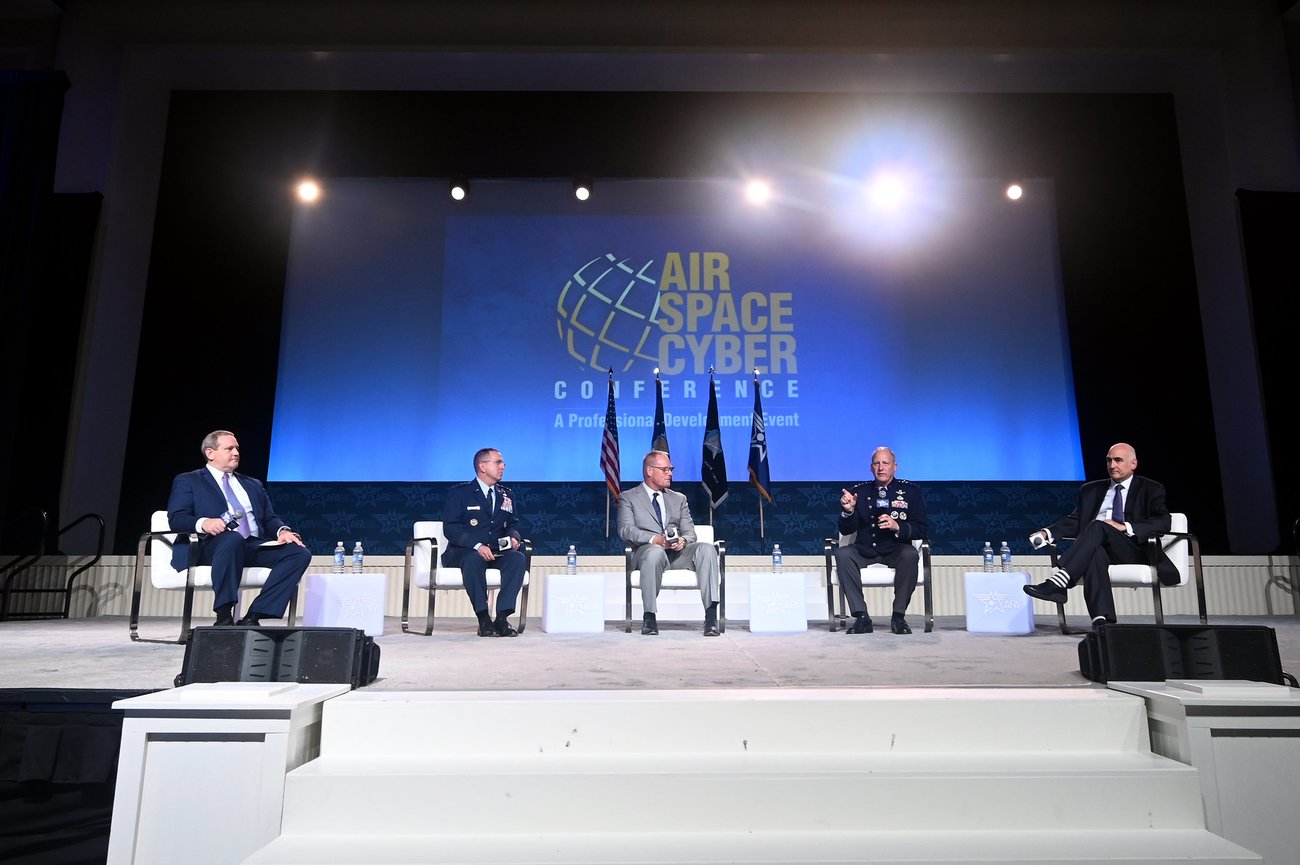National security insights for space professionals.
National security insights for space professionals. Delivered Tuesdays. |
|
|
|
Welcome to this week's edition of SpaceNews Military, your concise source for the latest developments at the intersection of space and national security. In this issue, we cover:
- Spy agency seeks to woo commercial tech firms - Space Force budget concerns take center stage at Air, Space & Cyber Conference
If this newsletter was forwarded to you, sign up for free here |
|
|
|
Space & defense brief 🛰️
|  |
|
|
|
NRO eyes commercial tech collaboration
The National Reconnaissance Office, known for its classified spy satellite programs, is making overtures to the commercial tech sector. NRO Director Christopher Scolese commented last week that the agency is pushing to create more opportunities for businesses to engage with its highly secretive operations.
Speaking at the U.S. Chamber of Commerce's Global Aerospace Summit, Scolese outlined initiatives aimed at lowering barriers for smaller companies: Established contractors are being asked to provide classified "SCIF" spaces for newer entrants. An upcoming "Tech Forum" to be held Oct. 17-18 in Chantilly, Virginia, will allow a "broad section" of industry players to interact with the NRO. "We're committed to creating more opportunities to engage new industry partners, expanding our outreach to small businesses, start-ups, and socially and economically disadvantaged business owners," an NRO spokesperson told SpaceNews.
The agency's Office of Contracts will host a "Pathways to Success" brief at the Tech Forum to demystify the bidding process. The NRO is responsible for building and operating the nation's spy satellites, The move comes as tech executives increasingly cite the complexity of federal acquisition processes and security clearance hurdles as major obstacles to defense contracting. By easing these pain points, the NRO hopes to tap into a wider pool of innovative capabilities from firms that have traditionally been shut out of the classified space.
| | |  |
|
|
|
Officials sound alarm on budget squeeze
Top Space Force and Air Force officials are sending a clear message at this week's Air Space & Cyber conference: The youngest military branch is feeling the fiscal pinch as its responsibilities continue to expand. Air Force Secretary Frank Kendall set the tone in his Monday address, highlighting resource adequacy as his primary concern. "As I look out at our needs going forward, it is clear to me that more resources will be required," Kendall said, even while acknowledging strong support from both the White House and Congress. The Space Force's second-in-command, Gen. Michael Guetlein, echoed these sentiments, pointing to a modernization slowdown due to budget constraints. Guetlein suggested that both military and industry partners are still "optimized for efficiency and for peacetime" — a luxury the service may no longer be able to afford. This chorus of concern follows similar remarks last week from Brig. Gen. Brian Denaro, the Space Force's plans and programs chief. Denaro painted a stark picture of a force struggling to juggle current operations with future-focused investments.
"We're going to need to invest in new capabilities," Denaro insisted, highlighting the challenge of maintaining critical satellite services — from GPS to missile warning — while simultaneously hardening systems against potential Chinese and Russian threats.
|
|
|
|
The U.S. National Geospatial-Intelligence Agency (NGA) selected 10 companies to compete for up to $290 million in contracts over the next five years to provide commercial satellite imagery and data analytics, aiming to bolster the government's global monitoring and intelligence capabilities. The following vendors will be on-ramped to the program known as Luno A: Airbus U.S. Space & Defense Booz Allen Hamilton BlackSky BlueHalo CACI Electromagnetic Systems Inc. Maxar Intelligence NV5 Geospatial Royce Geospatial Consultant - Ursa Space Systems
|
|
|
|
 |
The Space Security and Defense Program, a joint initiative of the Department of Defense and the Office of the Director of National Intelligence, on Sept. 11 issued a request for information (RFI) on advanced space domain awareness technologies. The SSDP is responsible for assessing potential threats to U.S. space assets and for gathering insights on technologies for the defense of U.S. systems.
The SSDP asks for "proven and innovative SDA concepts for use between 2030 and 2040" and is interested in industry capabilities and services available "at the scale and speed to effectively address threats in a dynamic and proliferated environment."
| | | | The U.S. military is investing in reusable reentry capsules designed by space startups to return cargo from space and deliver it to precise locations on Earth. These vehicles are seen as key tools for future space operations and logistics, as the Pentagon explores new methods to streamline transportation in space.
Startups specializing in reentry vehicle technology, such as Inversion Space and Outpost Space, recently secured more than $100 million in defense and private investments under the Strategic Funding Increase (STRATFI) initiative. | | |
|
|
|
|

No comments:
Post a Comment